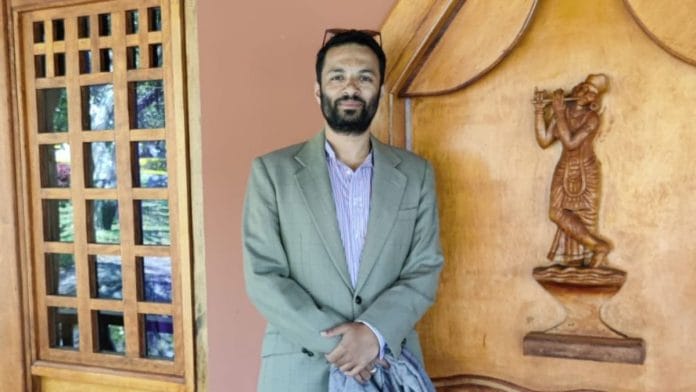Thank you dear subscribers, we are overwhelmed with your response.
Your Turn is a unique section from ThePrint featuring points of view from its subscribers. If you are a subscriber, have a point of view, please send it to us. If not, do subscribe here: https://theprint.in/subscribe/
A friend recently humbled me with a taunt saying, “we all tend to feel it, when it happens to us”
The comment, a part of a larger conversation, was made in context of the unsavoury arrest of Ali Khan – professor, author and erstwhile royalty.
Ali fits well as someone who could very well be that “us”. Be me.
I was familiar with Ali through family discourses in Lucknow about erstwhile princely estates located north of Uttar Pradesh’s capital – a region that is part of my own identity.
Being just a few years older, he was/is in many ways someone I looked up to because of all that he had achieved.
Khan’s academic profile is as illustrious as it is awe-inspiring.
His thesis and literary works reflect deep research and analysis of the muslim identity in south Asia, with further emphasis on the Shia muslim identity, which happens to be his own.
His book, “Poetry of Belonging: Muslim Imaginings of India 1850–1950”, uses Urdu poetry to understand the changing socio-political contexts at a time when the idea of a nationhood were still fluid. In this regard, he uses a relevant quote in context of today’s politically divisive landscape by Rahat Indori:
“Sab hi ka khoon hai shaamil yahan ki mitti mein/Kisi ke baap ka Hindustan thodi hai”
“Everyone’s blood is a part of this earth/India is not anyone’s personal property”
The quote could not have been better-timed in view of the charges levied against him under various sections of the Bharatiya Nyaya Sanhita (BNS), a thorough reading and comparison of which would leave one perplexed.
Khan’s incarceration came after a social media post (that was public) on Operation Sindoor where amongst other praises for the Indian state and its armed forces, he made a valid point which struck a nerve with people who seem to have been waiting for a momentary lapse on his part i.e. the ownership of muslims by right-wing commentators and politicians, and their persecution – all at their own convenience.
It took less than a fortnight for the Haryana police to dubiously carry out his arrest, under a complaint that really shouldn’t have gone beyond the police station where it was registered.
Yes, the police not only has the right, but also has the responsibility to study the finer nuances of freedom of speech before an FIR is filed, as was seen in the case ‘Imran Pratapgarhi vs The State of Gujarat’. Herein the Supreme Court judge, Abhay S. Oka, stated that the registration of the FIR against Imran was a clear abuse of power, in a case where the recitation of a poem had apparently offended people.
As a matter of fact, one of the complainants – the Haryana Women Commission’s chief, when asked to point out the offensiveness in Ali’s post on a TV debate, admitted that perhaps her understanding of English was ‘limited’.
This was preposterous since it implies that people with meagre understanding of a language can be offended by something they can’t even understand fully – to an extent that they could ensure legal action against it!
But being disappointed with such people in my opinion is akin to looking for hope where none exists.
What sent the alarm bells ringing for me and many others, along with the state’s abetment in the arrest, is the Supreme Court’s handling of the matter – that’s the epitome of justice I was taught to look at with unwavering faith.
On the contrary, the SC, by facilitating a Special Investigation Team to inquire into the charges against Ali, and by referring to his opinion as a means to seek “cheap publicity”, not only shook my faith in its institutional sanctity, it also left me with a lingering sense of fear and anxiety highlighted by a question that up till now, I had never taken seriously: Is my identity as a muslim relevant after all?
I recalled all those 26th January Republic day parades on TV that my grandmother insisted we watched in the early 90’s, the countless years of flag hoisting at my school where I was the only muslim, the fond childhood memories of my Brigadier uncle’s house in Delhi cantonment, and the unnumerable visits to my maternal place in Lucknow and further towards the Nanpara estate (close to Mahmudabad) where non-muslims were indispensable both as friends and in everyday business.
Ali was the same North Indian muslim – one who never donned a skull cap permanently, spoke English fluently and was deeply connected to his roots as an Indian – accepting its diversity and complexities. He’s of course a public figure and I am not.
Post this incident will he be the same?
And taking a page from his learnings, can I be the same?
As is evident with Ali’s case, ironically his factual comments on the country’s unitedness, has actually proven that it isn’t what we assume it to be.
These pieces are being published as they have been received – they have not been edited/fact-checked by ThePrint.


